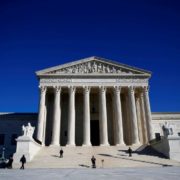The United States Supreme Court allowed the Trump administration to proceed with enforcing changes to the public charge rule that could deny legal permanent residency status to certain immigrants if they are likely to require government assistance in the future.
In a 5-4 vote on Monday, January 27, the conservative-leaning high court ruled in favor of the administration’s request to lift a lower court injunction that blocked the policy change from taking effect last October.
The liberal justices, Stephen Breyer, Ruth Bader Ginsburg, Elena Kagan and Sonia Sotomayor, voted to stop the policy from moving forward.
The White House lauded the decision as a “massive win for American taxpayers, American workers, and the American Constitution.”
Originally published by the Department of Homeland Security in August 2019, the public charge rule expands the test immigration officials use on immigrants to determine whether or not government programs will be incoming their sole source of financial, nutritional and shelter support.
“It is very clear the U.S. Supreme Court is fed up with these national injunctions by judges who are trying to impose their policy preferences instead of enforcing the law and we see this again with the Supreme Court stepping in the way they have here and we very much appreciate it,” Ken Cuccinelli, acting deputy secretary of Homeland Security, said in a statement hailing the ruling.
If a legal immigrant uses one or more designated benefits for more than 12 months of a 36-month period, they may be deemed a “public charge,” which could threaten their chances at getting a green card or lawful permanent resident status.
Under the Immigration and Nationality Act, the government has been allowed to reject granting green cards to immigrants who were determined to be a public charge. However, the proposed changes look at whether a person has used or is likely to use programs like most forms of Medicaid, Supplemental Nutrition Assistance Program (SNAP) and Section 8 housing vouchers and assistance.
The rule was supposed to take effect on October 15, 2019, but lawsuits filed by numerous states and nonprofit organizations put a temporary halt to it.
“The Rule is simply a new agency policy of exclusion in search of a justification,” Manhattan-based U.S. District Judge George Daniels wrote last October. “It is repugnant to the American dream of the opportunity for prosperity and success through hard work and upwards mobility.”
With around 544,000 individuals who apply for green cards each year, 382,000 of them are in categories that would fall under the expanded test, the Associated Press said in a report.
Critics of the new public charge rule have said that its implementation would punish immigrant families and would result in many families being forced to choose between maintaining immigration status or meeting basic needs like food.
Many experts also say that Monday’s ruling will deepen the “chilling effect.” Already, agencies and organizations around the country have reported declining enrollees for certain programs.
“This move by the Supreme Court is deeply disheartening and harmful for our low-income communities of color and our democracy,” Marielena Hincapié, executive director of the National Immigration Law Center, said in a statement on Monday.
A study by the Urban Institute published in May found that 1 in 7 adults in immigrant families reported avoiding public benefit programs in 2018 out of fear that they’d possibly endanger their future green card status.
Heng Lam Foong, senior policy manager with the Health Access Project at Advancing Justice – Los Angeles, previously told the Asian Journal that when the rule was first proposed, that about 3.8 million Asian American and Pacific Islander immigrants relied on some form of public benefit to make ends meet.
The rule is not retroactive, however, meaning that if an immigrant used these programs in the past, that won’t factor into any future public charge test to which they may be subjected.
The court’s ruling on Monday allows the rule to push through in every state except for Illinois because it is part of a separate injunction.
California Governor Gavin Newsom said the state is reviewing the decision and will “continue to fight against these efforts to terrorize immigrant families.”
In the meantime, advocates encourage immigrants to seek immigration advice if they are concerned about the ruling. (Christina M. Oriel/AJPress)






